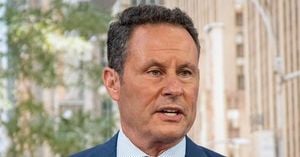Former President Donald Trump's recent nomination of Dr. Mehmet Oz to lead the Centers for Medicare and Medicaid Services (CMS) has ignited discussions across the political spectrum about the future of these pivotal health programs. If confirmed, Oz would be stepping in to oversee Medicare, Medicaid, and the Children's Health Insurance Program (CHIP), which together provide health coverage for more than 145 million Americans.
Dr. Oz, widely recognized for his career as a physician, heart surgeon, and television personality, has come under scrutiny for his past health claims and affiliations. Critics argue his celebrity status may overshadow the scientific standards typically expected from someone at the helm of such influential health programs.
Proponents of Oz's nomination highlight his vocal support for Medicare Advantage, which is viewed as both innovative and instrumental. Medicare Advantage is a private alternative to traditional Medicare, allowing beneficiaries to receive their health care from private insurers under Medicare’s umbrella. This program has gained traction over the years, with enrollment steadily growing among eligible seniors.
Oz made headlines back in 2020 when he penned an op-ed advocating for Medicare Advantage's expansion, arguing it could provide improved health care options for millions not currently covered by Medicaid. He suggested implementing such changes could be funded through payroll taxes and advocated for transitioning Medicare Advantage to the default option for beneficiaries.
While there are supporters who argue for the efficiency and potential cost savings of privatizing elements of Medicare, critics raise alarm over the risks such shifts pose. They fear increased reliance on private insurance could lead to higher out-of-pocket costs and limited access to necessary specialists, as not all doctors accept Medicare Advantage plans, complicately affecting patient care.
That said, nobody's really laid out clear directives from Oz just yet, especially concerning the future of Medicaid, though proposals from various GOP lawmakers signal possible changes. For example, some aim to swap the current federal matching funds structure for block grants, which would provide fixed funding to states. Advocates tout this as empowering states with more flexibility, but there’s skepticism on whether states could sustain care for low-income citizens without federal backing, particularly during economic downturns.
There's also chatter about introducing work requirements for Medicaid eligibility. Supporters of this idea argue it could encourage beneficiaries to find employment, yet detractors point out this could set up hurdles, leading to disenrollment without significantly increasing job participation rates.
Oz's potential leadership might suggest a shift toward privatization within federal health programs, with many wondering how this aligns with providing equitable health care access. The appointment has compelled various stakeholders to voice their opinions and expectations, casting hope and apprehension across healthcare landscapes.
With the changing tide of health care politics, all eyes will be on how Dr. Oz navigates the complexions of the Medicare and Medicaid systems, particularly as he balances the pressures of improving efficiency against the necessity for maintaining access to care.



